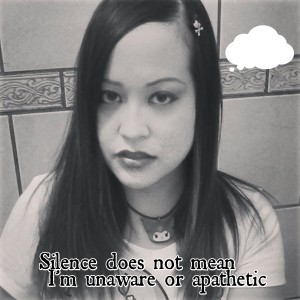A common statement I hear regarding social justice issues is that “Silence is acceptance” or “Silence equals consent”. Others believe that if you aren’t vocal about something, you’re apathetic. Those statements are true in certain circumstances but I disagree that they are blanket statements that can be made for everything. And they don’t apply to my social media and blog posts.  I’ve been reading things along the lines of: “If you aren’t making public statements about this, you’re part of the problem. It means you’re happy with the status quo”. Just because I don’t post about an issue doesn’t mean I’m unaware of it, that I’m not following what’s going on, or that I don’t care. In many cases, I am and I do.
I’ve been reading things along the lines of: “If you aren’t making public statements about this, you’re part of the problem. It means you’re happy with the status quo”. Just because I don’t post about an issue doesn’t mean I’m unaware of it, that I’m not following what’s going on, or that I don’t care. In many cases, I am and I do.
Firstly, if it’s already being talked about extensively, I may bring light to something else I’m not seeing shared, so that I’m not just adding noise to the other already-talked about issue that most of my friends already agree with anyway. We can learn about different issues at the same time. Or heck, I might post something cute or humorous instead. This doesn’t mean I think all my friends should do the same or that I’ll never chime in on a popular topic. But this is what I am doing in this case.
Secondly, when news stories break, the facts are often inaccurate and more things come to light, especially when it’s a complex case. I have commented on things in the past and have been wrong, so I have learned from that. As news outlets rush to be the first to report something, facts are sometimes wrong and are later corrected. It’s hard to unlearn something that’s incorrect. It’s impossible to completely unspread false claims. The corrections don’t always get as much attention as the initial reportings. I never forgot the lessons learned from the Columbine shootings. The numerous myths from 16 years ago still prevail today.
Thirdly, if I’m not an expert or am just going on guesses and feelings about things, my commentary adds nothing. If I don’t have any more info or insight than what’s already out there, not only are my guesses pointless, they may put false thoughts into others’ heads. For example, the conspiracy theories about Sandra Bland’s mugshots have given fuel to those who don’t believe her case is an important issue. I understand that human nature is to keep thinking while investigations are pending and we often can’t help but connect dots that are unrelated. But those statements can take away credibility in the minds of naysayers or fence sitters. And bringing up social justice issues isn’t just to preach to the choir but to present these causes to others.
Fourthly, most complaints I see that try to shame others for talking about one issue and not another are counterproductive and often alienate allies. “Why are you talking about a lion in Zimbabwe when there are humans in your own country suffering?” This sounds like there is an assumption that anyone talking about one issue doesn’t care about the other. It is impossible to bring up every social justice issue going on in the entire world and throughout history. And this is part of the reason why I will bring up a lesser talked about issue in the first place!
Fifthly, sometimes we just need to take a break. This is okay. We are not bad people for this. We can get mentally and emotionally burned out and may want to post inspiring art or silly memes. Constantly being connected to news with our smartphones can mean we need to take time to absorb it or avoid it. Posting on social media also means having comments and arguments that we may not have the time or energy to answer, explain, and clarify. We may be busy with our personal and professional lives. While I may be charged up about an issue, someone else I know may have been going through a lot and may need to focus on something else. Their silence doesn’t necessarily mean they think it’s unimportant.
Silence isn’t always consent, acceptance, or apathy. We may stay quiet on a case because we care – Because we think it’s important not to get it wrong or add to friends getting burnt out on the topic. In some cases, we should be encouraging it or at least not shaming others for it. If we don’t know something and the facts are still pending, not saying anything is better than saying something false.
Now enjoy this Depeche Mode video that isn’t exactly related.
